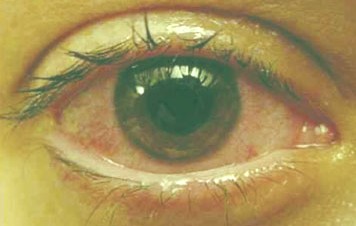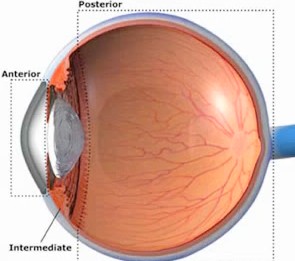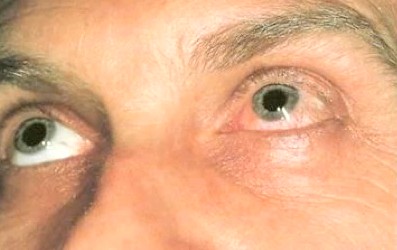What is uveitis?
Uveitis is a condition when an individual experiences unusual inflammation of the uvea of the eye. Eye’s uvea is a region which consists of three parts. The first part which people can actually see in the mirror is a colored ring of tissue called iris. Iris has a dark hole in the middle called pupil. The second and third parts are called ciliary body and the choroid respectively. They are present behind the iris and cannot be directly seen while looking at mirror. Inflammation in uvea can occur in iris, ciliary body and choroid. Inflammation in iris, ciliary body and choroid are called as iritis, cyclitis and choroiditis respectively. Uveitis condition may become serious and requires urgent attention by ophthalmologist.
Types
Uveitis is classified into anterior, intermediate, posterior and panuveitic forms. Anterior uveitis is the inflammation of iris and anterior chamber. Around 90% of the uveitis cases are the results of anterior uveitis. Anterior uveitis requires proper treatment; else it may recur in future. Intermediate uveitis is the inflammation of vitreous cavity cells. Posterior uveitis is the inflammation of retina and choroid and panuveitic is the inflammation of all layers of the uvea.
Causes of uveitis
There are several causes of uveitis. While some of the causes are unknown (idiopathic uveitis), autoimmune disorders like sarcoidosis, rheumatoid arthritis, behcet’s disease, ankylosing spondylitis and systemic lupus erythematosus are likely causes of uveitis. Infections and trauma can also cause uveitis. While the eye specialists do not usually know the causes of the occurrence of uveitis, it is known than the autoimmune disorders and injuries like blow to the eye, AIDS/HIV weakening the immune system, recent eye surgeries, inflammatory disorders like Crohn’s disease, infections like brucellosis , herpes, lyme disease, toxocariasis, toxoplasmosis, and even certain cancers can be the causes of uveitis. Uveitis is considered to be an isolated illness.
Symptoms and signs of uveitis
The symptoms of uveitis include painful eyes, aching, headache, red, bloodshot eyes, and sensitivity to lights, blurred or cloudy visions. Irregular pupil and floaters which are dark spots found in the visual field are some of the symptoms of uveitis.
Medical conditions associated with uveitis
Although uveitis is an isolated condition, several autoimmune diseases like sarcoidosis, lupus, rheumatoid arthritis, multiple sclerosis are some of the diseases which are associated with it.
Diagnosis
Uveitis is required to be timely diagnosed and if the symptoms are not identified and medical attention is not provided at the right time, it can damage the eyesight and patient may even become blind. Hence, ophthalmologist should be consulted at the earliest. When a patient visits an eye specialist, he may ask several questions with regard to the symptoms. The questions vary from eyes to discomfort in rest of the body like joint pains, weight changes, skin rashes, etc. Doctors may also ask for any existing diseases which a patient might be suffering from or the family history of the medical disorders. Doctors will then start his investigations by measuring the visions and eye pressures. He may advise some lab tests and X-ray. Depending on the test results, the doctors may look for any underlying cause and advice for additional medical examination and refer to other specialists to identify the root cause of uveitis. The prescribed medical tests may take time, post which doctors may suggest a treatment plan. Normally, the treatment begins in 24 hours. The eye specialists may also initialize the treatment based on clinical examination and severity of uveitis.
Treatment of uveitis
Serious uveitis is required to be treated instantly. Uveitis is an inflammatory disease; hence, doctors concentrate on controlling the inflammation. If uveitis is not caused by infection, doctors may advise usage of steroids either in the way of eye drops or by injecting in and around the eye, intravenously or administering them orally. Steroids can help in reducing the swelling and pain. For infectious uveitis, anti-infective medication such as antibiotics, antifungal or antiviral medication can be used. The duration of the treatment may be as short as a week or it may continue for several months depending on the cause. Other specialists may also prescribe a treatment based on the conditions. The patients are required to wear dark glasses which will help to reduce light sensitivity.
Complications
If the symptoms are not identified and timely treatment is not provided, then it may lead to serious complications which include permanent vision loss. If the inflammation is left unchecked, then it may lead to rise in eye pressure which may result in glaucoma. Fluid development in the retina can also cause cataract and vision blurring.
Prevention
Uveitis caused by unknown causes cannot be prevented. However, taking precautionary measures against trauma and infection can help in preventing uveitis. Practicing good hygiene, washing hands and regular health checkup can help in eradicating uveitis in future.
Uveitis Pictures



